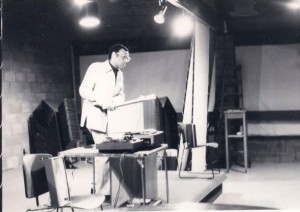I first learned of Paul Robeson when I was 15 years old. I was in Temple University’s Paley Library helping my father with his research, and I was looking for something to read in my free time. I found his autobiography, Here I Stand. I started asking questions in my classes about why Robeson had been blacklisted by the US government, causing my teachers some discomfort. At Princeton University, I met his cousin and had an opportunity to meet him, but I was told that his health was greatly diminished, so I declined. Even before Princeton acknowledged its native son, the impact of Robeson and his family on the town was evident. His mother’s monograph on the history of the black community of Princeton was still available, and his father’s church, Witherspoon Presbyterian was and still is and active part of the community. Through the efforts of a coalition led largely by Princeton student Adrien Wing, (who is now an internationally-renowned law professor) a street and community center was named for him. Unfortunately, he died in 1976 without the acknowledgment that he deserved.
Although I concluded that Robeson was sadly naive about the dangers of Stalinism, I found his talent, intellect and dedication to human rights inspiring.
This isn’t my favorite documentary of Robeson – it doesn’t recognize that not all of his critics were self-serving, for one thing — but you hear his words and voice, and that’s a good thing. I was fascinated by this clip about baseball great Jackie Robinson’s testimony against Paul Robeson before the House Un-American Activities committee.
I am partial to the documentary narrated by Sidney Poitier that focuses more on Robeson’s stage and concert work, including his groundbreaking performances of Othello. His meticulous preparation for his performances included learning the original languages and studying the cultural context of the music he sang. I remember a clip of him explaining to an interviewer about how doing this in preparation for Othello affected his pronunciation of certain words
That film also traces his transformation of one of his signature songs, Ol’ Man River in an affirmation of the struggle for human rights:
Here he is doing that amazing final monologue from Othello
Here is Robeson in a scene with actress Elizabeth Welch, “The River of Dreams.” I don’t know the film, but I’m guessing it must have been made in England, where Robeson could escape the stereotypical parts offered by Hollywood.
There are lingering questions about some episodes of Robeseon’s life — especially, whether his reputed 1961 suicide attempt and subsequent psychiatric hospitalization was really a CIA assassination attempt. His son, Paul Jr., thinks it very likely. Here’s a photo I took of Paul Jr when he spoke about his father at Princeton University. (I think it was during the fall semester of 1977, which would have been not long after Robeson, Sr.’s death.)
hospitalization was really a CIA assassination attempt. His son, Paul Jr., thinks it very likely. Here’s a photo I took of Paul Jr when he spoke about his father at Princeton University. (I think it was during the fall semester of 1977, which would have been not long after Robeson, Sr.’s death.)
Here is Robeson, Jr. explaining to Democracy Now! why he thinks his father was most likely drugged.
![]() Remembering Paul Robeson by Kim Pearson is licensed under a Creative Commons Attribution-NoDerivatives 4.0 International License.
Remembering Paul Robeson by Kim Pearson is licensed under a Creative Commons Attribution-NoDerivatives 4.0 International License.

